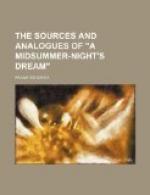In all the world there was no better harper than King Orfeo [Sir Orpheo], and no fairer lady than dame Meroudys. On a morning in the beginning of May, the queen went forth with her ladies to an orchard, and fell asleep under an “ympe"[66] tree till it was long past noon. When her ladies woke her, she cried aloud, tore her clothes, and disfigured herself with her nails. They sought assistance and put her to bed in her chamber, whither the king came to visit her, and ask her what might help her. She told him how in her sleep she had been bidden by a knight to come and speak with his lord the king; she refused, but the king came to her, with a hundred knights and a hundred ladies in white on white steeds, and his crown was all of precious stones. He bore her away to a fair palace, and showed her his possessions. Then he took her back, but bade her be beneath the tree on the morrow, when she should go with them and stay with them for ever.
King Orfeo was greatly distressed, and none could advise him. On the morrow he took his queen and ten hundred knights to guard her beneath the ympe tree; but in vain, she was away with the fairy, and they knew not whither. King Orfeo in grief called together his barons and knights and squires, and bade them obey his high steward as regent; he himself went forth barefoot and in poor attire into the wilderness, with naught but his harp.
So for ten winters he abode in the forest and on the heath, in a hollow tree, or under leaves and grass, till his frame shrank and his beard grew long; and ever and anon, when the day was fair, he would play his harp, and the beasts of the forest and the birds on bush and briar would come about him to hearken.
Then on a hot day he saw the king of fairy and his retinue riding with hounds and blowing horns; and again he saw a great host of knights with drawn swords; and again he saw sixty ladies, gentle and gay, riding on palfreys and bearing hawks on their wrists. Their falcons had good sport, and Orfeo drew nigh to watch; and looking on the face of one of the ladies, he recognised Meroudys. They gazed at each other speechless, and tears ran from her eyes; but the other ladies bore her away. The king followed them to a fair country where there was neither hill nor dale, and into a castle, gaining entrance as a minstrel. Then he saw many men and women sleeping on every side, seemingly dead; among them he again beheld his wife. And he came before the king and queen of that realm, and harped so sweetly that the king promised him whatever he might ask. He asked for the fair dame Meroudys; and he took her by the hand, and they fared homewards.
In his own city he lodged awhile in poor quarters, and then went forth to play his harp; and meeting his steward, who knew the harp but not his master, told him he had found the harp ten winters ago, by the side of a man eaten by lions. This evil news caused the steward to swoon, whereupon King Orfeo revealed himself, and sent for dame Meroudys. She came in a triumphant procession; there was mirth and melody; and they were new-crowned king and queen. Harpers of Bretayne heard this tale and made the lay and called it after the king




